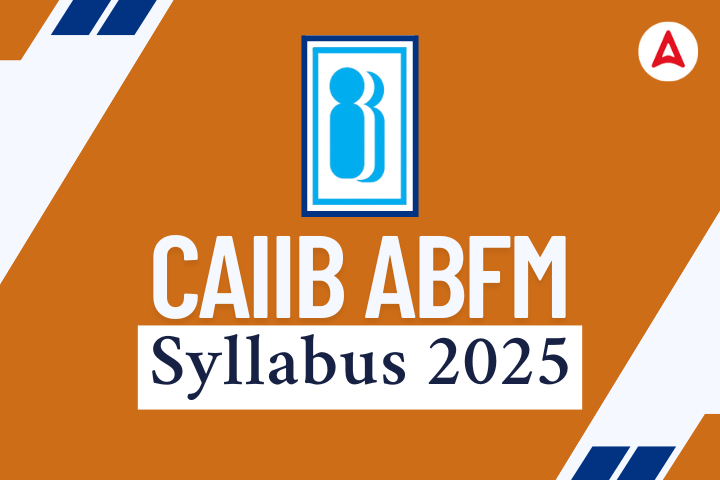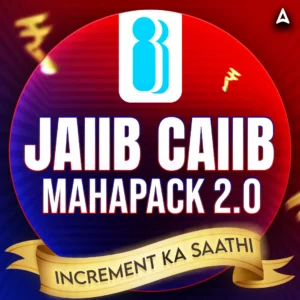The CAIIB ABFM Syllabus 2025 is a key component for banking professionals aspiring to advance their careers through internal promotions. Conducted by the Indian Institute of Banking and Finance (IIBF), the Advanced Business and Financial Management (ABFM) paper is one of the four compulsory subjects under the revised CAIIB examination structure. In this article, candidates will find a comprehensive overview of the updated syllabus, designed to help them prepare strategically and effectively for the ABFM paper.
CAIIB Registration 2025- Click to Apply
CAIIB ABFM Syllabus 2025
The CAIIB ABFM Syllabus 2025 consists of a total of four modules: Module A – The Management Process, Module B – Advanced Concepts of Financial Management, Module C – Valuations, Mergers and Acquisitions and Module D – Emerging Business Solutions. A total of 100 questions are asked in this paper.
CAIIB ABFM Syllabus 2025 Module-Wise
The CAIIB ABFM Syllabus 2025 is divided into multiple modules, each focusing on a specific area of advanced business and financial management. Understanding the syllabus module-wise helps candidates plan their preparation systematically for the CAIIB Exam and ensures comprehensive coverage of all topics. Below is a detailed breakdown of the ABFM syllabus as prescribed by the IIBF:
CAIIB ABFM Syllabus 2025: Module A – The Management Process
Module A of the CAIIB ABFM Syllabus 2025 focuses on the fundamentals of the management process within the banking and financial ecosystem. It covers key concepts such as planning, organizing, staffing, and basics of management, which are essential for effective managerial roles.
Basics of Management
Definition of Management, The Management Process, Functions of Management, Importance of Management, Management Thoughts & Approaches, Management Challenges & Opportunities, Introduction to Strategic Management, Business Environment Analysis
Planning
Fundamentals of Planning, Steps in Planning, Importance of Planning, Advantages and disadvantages of planning, Management by Objectives, Plan Components, Contingency planning, Forecasting & Decision Making
Organizing
Introduction and Fundamentals of Organizing, Importance of Organisation, Stages in Organising Process, The Organising Process, Principles of organizing, Types of Organisations, Organisation structure, Organisation charts and manuals, The Organisation culture, Authority & Responsibility, Key Issues in Organisation Structure, Organisational Change, Conflict Dynamics
Staffing
Functions of Staffing, Objectives of staffing, Nature of staffing, Facets of staffing, Significance of staffing, System approach to staffing, Recruitment, Selection, Training, Retention and development, Knowledge and learning management,Performance Appraisal, Human Resource Development
Directing
Characteristics of directing, Importance of directing, Elements of directing, Leadership, Motivation, Communication, Supervision
Controlling
Basics of Controlling, Characteristics of controlling, Advantages of controlling, Limitations of controlling, Types of control management, Control process, Relation between planning and control, Control Techniques, Control technique and Information Technology
CAIIB ABFM Syllabus 2025: Module B – Advanced Concepts of Financial Management
Module B of the CAIIB ABFM Syllabus 2025 delves into advanced financial management concepts crucial for strategic decision-making in banking. It covers topics like Sources of Finance and Financial Strategies, Financial and Operating Leverages, Capital Investment Decision, etc. to enhance financial planning and control capabilities.
Sources of Finance and Financial Strategies
Equity Capital, Internal Accruals, Preference Capital, Term Loans, Debentures, Alternative Financing Strategies in the Context of Regulatory Requirements
Financial and Operating Leverages
Financial Leverage, Degree of Financial Leverage and its Behaviour, Operating Leverage, Degree of Operating Leverage and its Behaviour, Combined or Total Leverage
Capital Investment Decisions
Objective of capital investment decisions, Estimation of project cash flows, Forecasting and its relation to regulation of capital for short, medium and long term periods, Relationship between sales, production and other functional budgets, Cash Forecasts, Cost analysis for projects, Methods of Investment appraisal;Social Cost Benefit Analysis
Capital Budgeting for International Project Investment Decisions
Foreign Investment Analysis, Special Considerations-Foreign & Home Currency Cash Flows, Foreign Currency Discount Rates Computation, International Portfolio Investment and Institutional Constraints, Direct and Indirect Channels for International Portfolio Investment, Exchange and Country Risk, Return and Risk of Foreign Investment, Capital asset pricing model, Arbitrage pricing theory; International Capital Budgeting Issues involved in overseas projects, Approaches for evaluation of overseas projects, Evaluation methods, , Impact of transfer pricing
Adjustment of Risk and Uncertainty in Capital Budgeting Decision
Sources & Perspectives on Risk, Sensitivity Analysis, Scenario Analysis, Hillier Model, Simulation Analysis, Decision Tree Analysis, Corporate Risk Analysis, Managing Risk, Project Selection Under Risk, Risk Analysis in Practice
Decision Making
Decision Making using Cost-Volume-Profit (CVP) Analysis, Decision Making using Relevant Cost Concepts, Decision Making using Activity Based Costing, Ethical and Non-Financial Considerations Relevant to Decision Making
CAIIB ABFM Syllabus 2025: Module C – Valuations, Mergers and Acquisitions
Module C of the CAIIB ABFM Syllabus 2025 explores critical aspects of business growth and restructuring through valuations, mergers, and acquisitions.
Corporate Valuations
Approaches to Corporate Valuation, Adjusted Book Value Approach, Stock and Debt Approach, Direct Comparison Approach, Discounted Cash Flow Approach, Steps involved in valuation using DCF Approach,
Discounted Cash Flow Valuation
Estimating Inputs, Approaches to Discounted Cash Flow Models, Various discounted Cash Flow Models, Dividend Discount Model, Applicability of the Dividend Discount Model,
Other Non-DCF valuation models
Relative valuation model, Equity Valuation Multiples Model, , Enterprise value multiples Model, Choosing the right multiples, Book value approach Model, Stock and debt approach
Special cases of valuation
Intangibles –Brand, Human valuation etc., Real estate Firms, Start-up firms, Firms with negative or low earnings, Financial Service companies, Distressed firms, Valuation of cash and cross holdings, Warrants and convertibles, Cyclical & non-cyclical companies, Holding companies, E-commerce firms
Mergers, Acquisitions and Restructuring
Types of Transactions, Reasons for Merger, Mechanics of a Merger, Costs and Benefits of a Merger, Exchange Ratio in a Merger, Purchase of a Division / Plant, Takeovers, Leveraged Buyouts, Acquisition Financing, Business Alliances, Managing Acquisitions, Divestitures, Holding Company, Demergers Deal structuring and financial strategies
Negotiations, Payment and legal considerations, Tax and accounting considerations, Tax reliefs and benefits in case of Amalgamation in India, Financial reporting of business combinations, Deal Financing, Financing of cross border acquisitions in India
CAIIB ABFM Syllabus 2025: Module D – Emerging Business Solutions
Module D of the CAIIB ABFM Syllabus 2025 focuses on the evolving landscape of business and banking through the lens of digital transformation and innovation.
Hybrid Finance
Advantages and disadvantages of Hybrid securities, Types of hybrid securities, Preference Share Capital, Features of Warrants, Features of Convertible Debentures, Differences between Warrants and Convertible debentures, Valuation of Warrants, Valuation of Compulsorily Convertible (Partly or fully) Debentures, Objective of issuing Warrants and Convertible debentures, Features of Foreign Currency Convertible Bond (FCCB), Mezzanine Financing, Innovative Hybrids
Start-up Finance
Benefits to startup under the Startup Plan, Startup definition in India, Challenges faced by Startups, State Startup Policy, Pitch Presentation, Programmes and competitions for startups, Tax exemptions, Funding, Investor’s outlook in Startups, Funding schemes and programmes, International challenges and bridges
Private Equity and Venture Capital
Characteristics of Venture Capital Investments, Characteristics shared by Private Equity and Venture Capital as well as their key distinctions, Financing options available through Venture Capital, Investment in Private equity, Benefits obtained through private equity, Drawbacks to the practice of private equity, Due diligence, Exit Strategies
Artificial Intelligence
History of Artificial Intelligence, Applicability of Artificial Intelligence, Artificial Intelligence in Banking and Finance, The future scope of Artificial Intelligence, Neural Networks, Control Theory and Cybernetics, Rational Agents, Motion and Manipulation, Tools and Techniques of Artificial Intelligence, Artificial Intelligence and Morality
Business Analytics as Management Tool
Essentials of Business analytics, Types of Analytics, Elements of Business Analytics, Big Data Analytics, Web and Mobile Analytics, Comparing web Vs Mobile Analytics, Importance of Business Analytics
Green and Sustainable Financing
ISO Standards for Green Finance, Building Green Finance, International Best Practices towards Green Finance, Public Policy in India, Progress of Green Finance in India, Challenges and way forward, Growth of Regulatory Framework, National Efforts towards Green and Sustainable Financing, RBI Views on Climate Risk and Sustainable Finance
Special Purpose Acquisition Company
Advantages of SPAC, Disadvantages of SPAC, SPAC Formation and Timelines, The SPAC Merger, Stakeholders, Characteristics of SPACs, Process, SPAC Capital Structure, Trust Account, Warrants, Forward Purchase, IPO Agreements, De-SPAC Process




 RRB Pharmacist Syllabus 2026, Check Exam...
RRB Pharmacist Syllabus 2026, Check Exam...
 RRB Paramedical Syllabus 2026, Check Exa...
RRB Paramedical Syllabus 2026, Check Exa...
 RRB Staff Nurse Syllabus 2026, Check Exa...
RRB Staff Nurse Syllabus 2026, Check Exa...



 Adda247 Job portal has complete information about all Sarkari Jobs and Naukri Alerts, its latest recruitment notifications, from all state and national level jobs and their updates.
Adda247 Job portal has complete information about all Sarkari Jobs and Naukri Alerts, its latest recruitment notifications, from all state and national level jobs and their updates.




